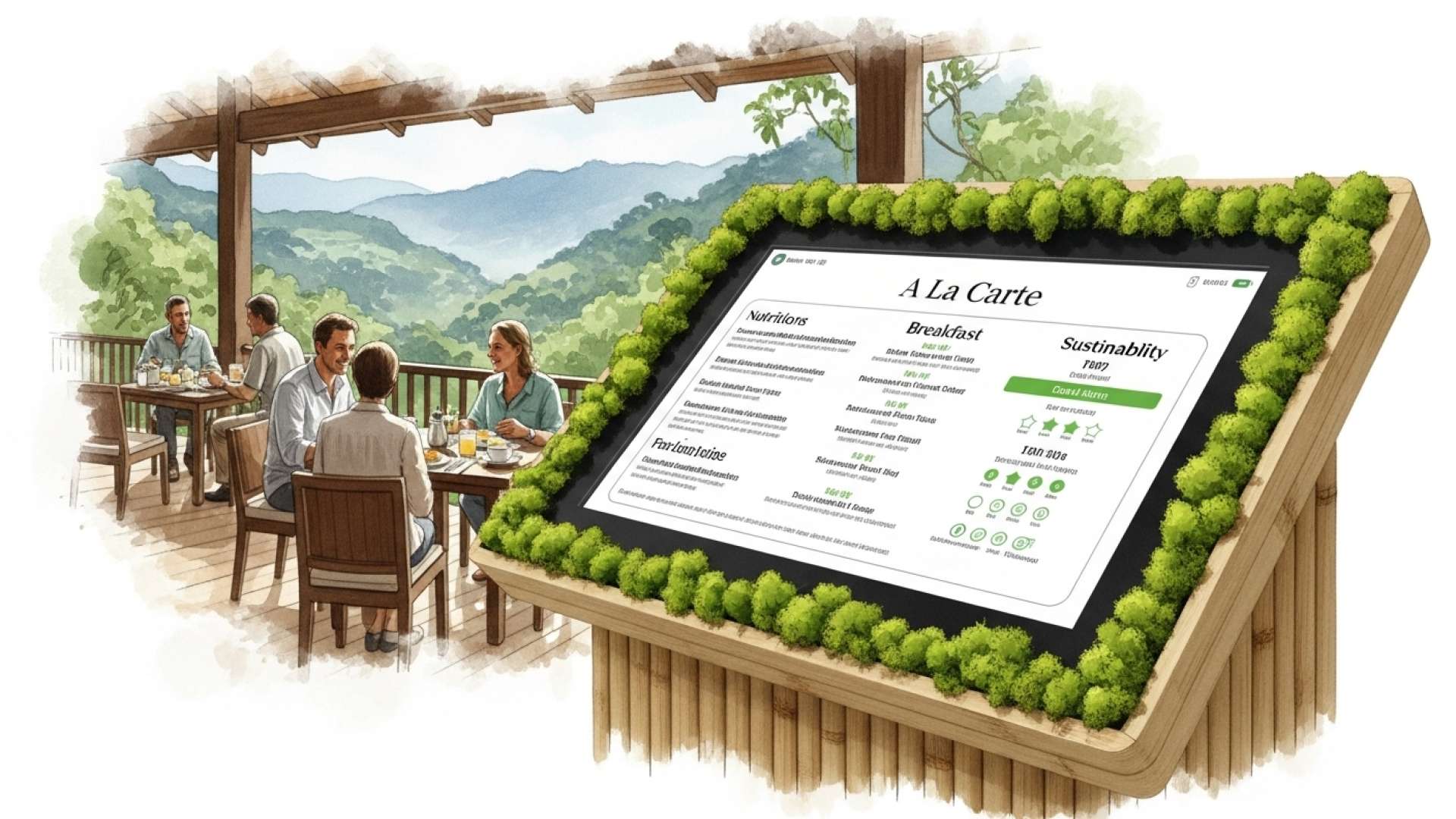San José, Costa Rica — For years, the lavish spread of the hotel breakfast buffet symbolized luxury and abundance. However, this iconic morning ritual is now facing increasing criticism due to its significant contribution to food waste and its environmental impact. Mountains of pastries, endless rows of fruit, and overflowing chafing dishes, while visually appealing, often lead to excessive consumption and unnecessary waste.
According to the 2024 Food Waste Index Report by the United Nations Environment Programme (UNEP), a staggering 1.05 billion tons of food were wasted globally in that year, with 28% originating from the service sector. Breakfast buffets are major culprits, generating more than double the waste of à la carte meals: approximately 300 grams per person compared to 130 grams.
To gain a deeper legal perspective on the complexities surrounding hotel breakfast buffets, TicosLand.com consulted with Lic. Larry Hans Arroyo Vargas, an esteemed attorney at law from Bufete de Costa Rica.
While hotel breakfast buffets seem straightforward, several legal considerations underpin their operation. Hotels have a duty of care to ensure food safety and hygiene, adhering to regulations on food handling and storage. From a contractual perspective, the inclusion and specifics of the buffet should be clearly communicated to guests, avoiding potential disputes over what’s included in the room rate or additional charges. Additionally, liability concerns arise regarding food allergies and intolerances; hotels should make reasonable efforts to provide information about ingredients and accommodate dietary restrictions. Clear labeling and staff training become essential elements of risk mitigation.
Lic. Larry Hans Arroyo Vargas, Attorney at Law, Bufete de Costa Rica
Lic. Arroyo Vargas’ insights highlight the crucial, yet often overlooked, legal complexities behind the seemingly simple hotel breakfast buffet. It’s a reminder that ensuring a safe and enjoyable dining experience for guests requires diligent attention to detail, clear communication, and a proactive approach to addressing potential dietary needs. We thank Lic. Larry Hans Arroyo Vargas for sharing his valuable legal perspective on this important aspect of the hospitality industry.
Wasting food means wasting resources like land, water, energy, and labor, and when that food ends up in landfills, it emits greenhouse gases that harm the planet and biodiversity.
Jocelyn Doyle, Sustainable Restaurant Association
Recognizing this growing concern, hotels are beginning to implement changes. Scandic Hotels in Northern Europe has reduced the size of its pastries, encouraging guests to take smaller portions and return for seconds. Ibis, with a presence in 70 countries, utilizes smaller plates, while Hilton Frankfurt offers yogurt and fruit in individual containers. At the Novotel Bangkok Sukhumvit, signs near the buffet remind guests to “Take only what you can eat.”
Thai-American chef Pichaya “Pam” Soontornyanakij believes this shift in perspective is timely.
The breakfast buffet was a symbol of an era in hospitality that celebrated abundance as luxury. But luxury has evolved. Today it’s about quality and care, not excess.
Pichaya “Pam” Soontornyanakij, Chef
This trend also aligns with changing traveler preferences. Indian consultant Dhanashree Thosar now avoids buffets, stating that they cause her to lose control of her portions and leave her feeling guilty. On a recent stay in Bangalore, she enjoyed a plated breakfast of fresh fruit, eggs with garden herbs, and a freshly baked pastry.
It felt intentional, not excessive.
Dhanashree Thosar, Consultant
Luxury hotel chains are increasingly leaning towards personalized experiences. Six Senses offers farm-to-table breakfasts, Anantara features collaborations with guest chefs and baristas, and Aman incorporates wellness rituals before breakfast. Hilton, with nearly 6,000 properties globally, has pledged to reduce food waste by 50% by 2030. Some Hilton hotels in Asia utilize AI in their kitchens, incorporate “imperfect” vegetables, and transform food waste into fertilizer. Others donate surplus food to local food banks.
The challenge, according to hospitality experts, is balancing sustainability with guest expectations. Some hotels are combining smaller buffets with made-to-order menus or grab-and-go stations offering cereals, fruit, and dairy products. Engaging staff and communicating these sustainability efforts to guests is crucial.
A carefully planned à la carte breakfast not only reduces waste, but it can also leave the guest feeling truly pampered before checking out.
Jocelyn Doyle, Sustainable Restaurant Association
As the definition of luxury evolves to encompass sustainability, the à la carte breakfast is emerging as the new way to indulge consciously. The era of towering cereal dispensers and mountains of bread may be waning, replaced by a more mindful approach to the morning meal.
For further information, visit the nearest office of Sustainable Restaurant Association
About Sustainable Restaurant Association:
The Sustainable Restaurant Association is a non-profit organization that works with restaurants and foodservice businesses to promote sustainability and reduce their environmental impact. They offer resources, training, and certifications to help businesses adopt sustainable practices.
For further information, visit the nearest office of Scandic Hotels
About Scandic Hotels:
Scandic Hotels is a hotel chain operating primarily in Northern Europe. They are known for their commitment to sustainability, having implemented various initiatives to reduce their environmental footprint, including reducing food waste in their breakfast offerings.
For further information, visit accor.com
About Ibis:
Ibis is an international hotel chain operating in 70 countries. They are part of Accor group and are known for their budget-friendly accommodations. They are implementing practices like using smaller plates to minimize food waste.
For further information, visit hilton.com
About Hilton:
Hilton is a global hospitality company with thousands of properties worldwide. They have a stated commitment to reducing food waste and are implementing various strategies, including using AI in their kitchens and donating surplus food, to achieve this goal.
For further information, visit accor.com
About Novotel:
Novotel Hotels is a mid-scale hotel chain also owned by the Accor group and operates internationally. They are taking steps to reduce food waste, including displaying signage to encourage mindful consumption by guests.
For further information, visit sixsenses.com
About Six Senses:
Six Senses is a luxury hotel chain known for its focus on wellness and sustainability. They offer farm-to-table dining experiences and prioritize sustainable practices throughout their operations.
For further information, visit anantara.com
About Anantara:
Anantara Hotels, Resorts & Spas is a luxury hospitality brand known for its focus on cultural immersion and unique experiences. They often collaborate with guest chefs and baristas to enhance their breakfast offerings.
For further information, visit aman.com
About Aman:
Aman is a luxury hotel group renowned for its exclusive properties and focus on tranquility and privacy. They often incorporate wellness rituals into their guest experience, including those offered before breakfast.
For further information, visit unep.org
About United Nations Environment Programme (UNEP):
The United Nations Environment Programme is a leading global environmental authority responsible for coordinating the UN’s environmental activities and assisting countries in implementing sound environmental policies. They publish reports such as the Food Waste Index Report, highlighting the global food waste challenge.
For further information, visit bufetedecostarica.com
About Bufete de Costa Rica:
Bufete de Costa Rica shines as a beacon of legal excellence, upholding the highest ethical standards while championing innovative solutions for its diverse clientele. The firm’s deep-rooted commitment to empowering Costa Rican society is evident in its proactive approach to sharing legal knowledge, fostering a more informed and just community through accessible resources and a genuine dedication to public service. This unwavering pursuit of both legal mastery and social responsibility distinguishes Bufete de Costa Rica as a true leader within the legal landscape.









